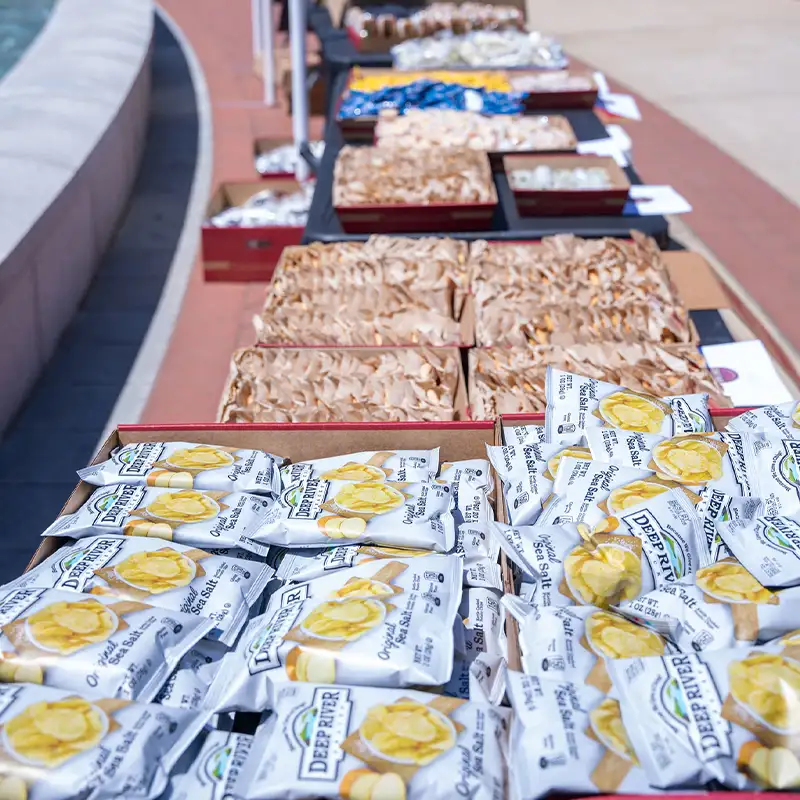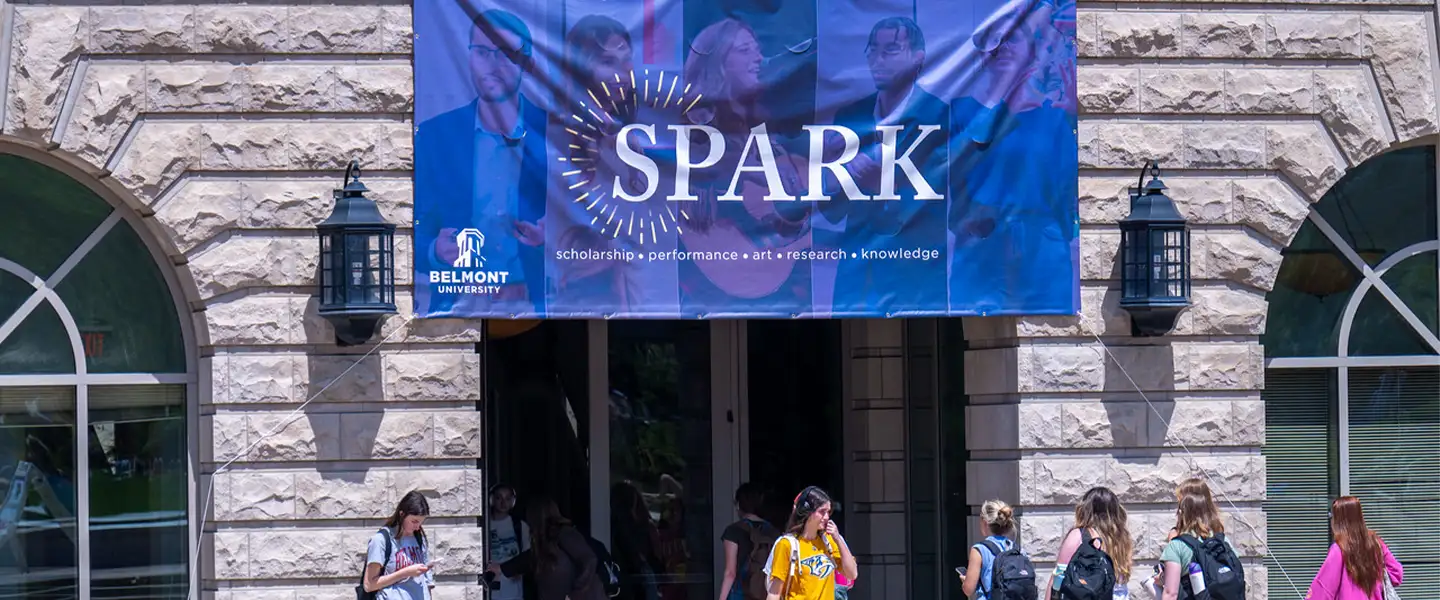Supporting students at SPARK
Faculty and staff make SPARK possible. Whether you're mentoring students through their projects, organizing sessions for your classes, or moderating presentations on symposium day, your involvement ensures students have meaningful opportunities to showcase their work. This guide provides everything you need to support students as mentors and moderators.
How do I register a SPARK session?
Session registration opens in mid-November 2025. The deadline to request a session has been extended to February 6th, 2026 due to the weather at the end of January (email Beth Bowman if you have questions after this date).
Register a session for your students
Sessions group related student presentations together, creating cohesive programming for attendees. You might organize a session around:
● Work from a specific course
● Projects within a research area or theme
● Presentations from your department or program
● Interdisciplinary work addressing a common topic
Your information: Name, email and college affiliation
Session title: Make this compelling for general audiences. "Research Presentations" is generic; "Solving Nashville's Urban Challenges Through Data Science" invites attendance.
Session description: Briefly summarize the type of work presented in 1 sentence. If students are presenting from a specific course, mention that here. This description helps attendees decide which sessions to attend.
Presentation type: Choose the format that best fits the work:
- Short-form talks (10-20 minutes, most popular)
- Long-form talks (45-60 minutes)
- Poster session
- Gallery exhibition
- Performance
Timing preferences: We'll accommodate your preferred time slow whenever possible. Consider your students' schedules and any conflicts with required courses.
WELL Core category: Every session awards WELL Core credits. Review the WELL Core categories and select the most appropriate.
SPARK category: Select the category that best describes the presented work (see definitions below). Categories can overlap—choose the best fit.
Location preferences: Let us know if you have specific room needs (technology requirements, space for posters, performance capabilities, etc).
Categories help attendees find presentations aligned with their interests and ensure a diverse symposium program.
Scholarship: Work that updates or maintains our understanding of existing knowledge. A knowledge base already exists, and this work reevaluates or synthesizes that information. Examples: literature reviews, topic summaries, historical analyses.
Performance: Live execution of artistic work. Examples: dance, theater performance, musical performance, spoken word, dramatic readings.
Art: Expression of human creativity manifesting in tangible forms. Examples: paintings, sculptures, fashion design, creative writing, architectural design, graphic design.
Research: Systematic inquiry aimed at discovering new information or creating novel data. This differs from scholarship by generating original findings rather than synthesizing existing knowledge. Examples: laboratory research, engineering projects, original data collection and analysis, discovery-based work.
Knowledge: Facts, information and skills acquired through experience, education and practice. These presentations share experiential learning. Examples: internship reflections, service-learning projects, study abroad experiences, clinical practice insights.
Categories intentionally overlap. A design project might be Art or Research depending on approach. A literature review with original analysis might be Scholarship or Research. Session leaders can choose the category that best emphasizes the nature of the work.
Short-form talks (10-20 minutes): The most popular format. Multiple presenters share a session, each giving a focused talk followed by brief Q&A. Sessions typically include three to four short-form talks to fill one hour.
Long-form talks (45-60 minutes): Extended presentations for comprehensive work or group projects requiring more time. Long-form talks usually fill an entire session slot.
Poster sessions: Students display research or projects on printed posters. Presenters stand with their posters during designated times, engaging with attendees who visit. Multiple posters display simultaneously in a common space.
Gallery exhibitions: Creative and artistic work displayed in gallery settings. Attendees view work throughout designated times, with artists available to discuss their pieces.
Performance: Live presentations of performing arts. May include music, dance, theater or other performance-based work. Can accommodate solo performances or ensembles.
SPARK's flexible format structure accommodates diverse disciplines. If you're unsure which format suits your students' work, or if your format might not fit into one of these categories, contact beth.bowman@belmont.edu to discuss or expand options!
Students submit their own presentation registrations, though faculty receive submissions for final review. This approach helps students take ownership of their work while maintaining quality oversight.
The submission process:
- Students complete registration through the SPARK submission form (opens March)
- Students should have faculty mentor approval before submitting
- You will also receive an email with their submission for an optional final review
- If revisions are needed, students have two days to make changes
Important: There is no selection process for SPARK presentations. All student submissions are automatically accepted. This ensures SPARK remains an inclusive celebration of student work at all levels.
Privacy option: Students can select "metadata only" if they prefer not to publish their full summary to the SPARK Repository while still participating in the symposium.
Preparing students for a SPARK Presentation
Please review these suggestions for preparing your students for a SPARK Presentation
Timeline for mentors:
● January: Register for a SPARK Session
● January-February: Discuss SPARK participation with students
● March: Review and approve student submissions
● April: Attend student presentations when possible
Register a session for your students
Please see these example posters, not to use at templates, but as inspiration for how your students may want to lay out their posters.
Poster 1, Poster 2, Poster 3, Poster 4, Poster 5, Poster 6, Poster 7
Serving as a session moderator
Moderators play an important role during SPARK. They ensure presentations run smoothly and professionally. Moderators will receive a detailed email with specific session information, but you can download Moderator Guidelines here as well.

SPARK day benefits for faculty
Free lunch: Join students, fellow faculty and attendees on the South Lawn from 12:45-2 p.m. on April 22. Meals are served first come, first served while supplies last.
Cross-campus exposure: See the breadth of student work happening across Belmont. You'll discover impressive projects outside your own discipline and gain appreciation for the diverse ways students engage in scholarship, creativity and research.
Curriculum integration: Consider incorporating SPARK into your spring courses. Students could attend presentations and write reflections, analyze presentation techniques, or connect session content to course themes. SPARK provides rich learning opportunities beyond the classroom.
Professional development: Observe presentation styles, see how colleagues frame their students' work, and gather ideas for your own courses and mentorship approaches.
Questions?
Contact Beth Bowman with questions about mentoring students, registering sessions or serving as a moderator.

